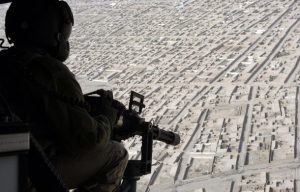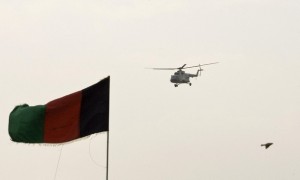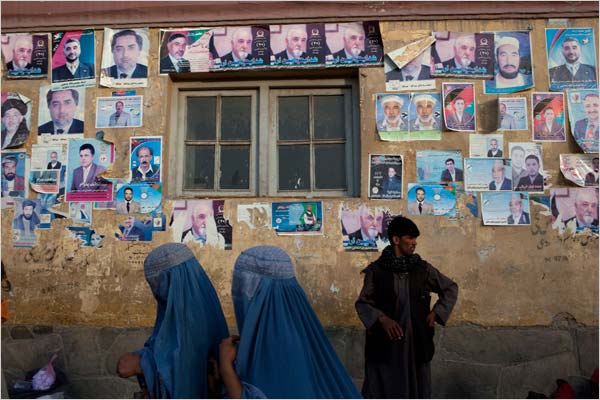Hospitable People, Inhospitable Terrain
Afghans are known for their legendary hospitality and code for their guests. While at work, Adeel and his team received numerous offers from Afghan villagers to have lunch with their family. As direct refusal is considered extremely rude, they had to offer the excuse that they can only eat once their work is over. But they couldn’t refuse a man who came with his cute six year old girl.
“My girl wants to say something to you guys,” the young man, who looked in his late twenties ,whispered into Adeel’s ears. “I’ve made some food with my mother. Do you not want to eat it with us?” the girl said in a sweet irresistible tone. None of them could say no to her…
The little girl, named Sughra, lived in a typical village house. Big mud-walled house with kitchen on one side and a bed on the other far end of the hall-like room. The only possession they could be proud of was their old color television set.
The smell of aromatic rice mesmerized both Adeel and his driver Karim. The little girl was way too happy to have guests in her house. Her mother stayed in the kitchen to make some flat bread called chapati. “I’m worried about her future my friends,” Sughra’s father told in a concerned voice. “The Taliban are trying to make a comeback and I’m afraid they’ll burn down the nearby girls’ school. How will she learn to read and write if that happens?” the anxious villager asked.
“There was a time when the Taliban could have been trusted. They were naive people for sure but they were not criminals. They were the ones who ended the bloody 1992-1996 civil war in Kabul by kicking out the warlords. They wanted to bring some change. They did too many things at the same time and lost control due to incapacity,” the villager reminisced. “Even if there was no money in Afghanistan, we still had peace. Now we have no peace while the money is in the hands of few puppets,” Sughra’s father remarked with a hollow tone. An eerie silence prevailed while everyone tried to finish their meals.
The serious conversation continued during the lunch only to be interrupted by Sughra’s laughter. She kept on asking childish but cute questions that at times made everyone laugh. Holding her finger while Sughra danced to a tune, Adeel asked her father: “What future do you want to give her?” Her young father sealed his lips with an empty smile.
“I wish to have a system in this country that makes her dreams come true. That works for the betterment of children like her. A future where they can live in peace with no fear from inside or the outside,” Sughra’s father said while holding his hands together as if making a prayer. They all said nothing but “Amen” in unison. What else could they have said?
Clear Message
Soon they left for work. It was sheer hard work amidst hot, dusty afternoon. The view from top of the tower was breathtaking. “I saw poppy fields from up there,” Adeel said in an excited tone. He couldn’t believe his eyes when he saw hectares of poppy fields spread across the plains.
Soon the village chief called in. He came with a request to have tea with the village elders once the work is completed. This was another hospitality call that they couldn’t refuse to attend.
The village chief’s house had a big lounge with traditional seating arrangement. An elegant Afghan carpet was laid on the floor adored with cushions. Tea was ready and was served to the guests in small cups. Candies instead of sugar cubes were there as tea sweetener, another unique Afghan custom.
The informal meeting started when Adeel and his team was showered with praise for the work they did. The elders raised their hands and prayed for the success of each and every member of the telecommunications installation team. But within no time the prayers turned to requests and requests changed to complaints.
“We are really fed up of the nearby Coalition forces base,” the village leader said in an irritating tone. All the others nodded in agreement. “This base comes under attack by the Taliban on daily basis. We do not know about the casualties they suffer but their anger is vented at us. They come to our village and round up our youth. They accuse them of being Taliban sympathizers. How can we support Taliban when we do not like them at all?” the clan chief said in a perturbed voice.
The atmosphere was very tense. Everyone was telling about the recent aerial bombing that claimed lives of innocent civilians. Some of the elders lost their families in the air raid that was carried out by the coalition air force. Instead of hitting enemy positions it hit the village. Civilians killed in such incidents are known as ‘collateral damage’ in the Allies’ military dictionary.
While everyone was sipping their last bit of tea, the village leader made a very interesting comment. “My son,” he said to Adeel while addressing him. “We have lived under various systems when the British left us in 1919. We have lived under a king. We have seen democracy. We have witnessed communism. We have braved the advances of warlords and lived under their arbitrary rule,” the seventy-something village elder said in a soft tone. “What we have never lived under is foreign occupation. We are the people who resist hegemony. We hate it more than anything else in this world,” the chief reaffirmed.

A member of the NATO-led coalition force on a helicopter patrol in Kandahar, southern Afghanistan. Afghans have long demanded an end to misuse of aerial fire power and night time raids. (Reuters)
“We would somehow accept the harsh Taliban rule but life under foreign occupiers is against our national code. We die happily resisting their occupation than live sadly supporting the imperialists.” The tea finished and so did the meeting.
Lost Hopes
The evening was drawing to a close. Adeel was quick to point out an unusual view in the sky where the clouds were scattered as if being smashed by a big hammer. He rejoiced for a while but then quickly added: “I think the hopes of the people of Afghan are smashed the same way. The promises made nine years ago still remain a distant reality. What we see on the ground is reflected in the sky I reckon,” the telecommunications engineer conferred with me.
Its been a week since the presidential elections in Afghanistan. A month since NATO-forces completed a military operation against the Taliban in different parts of the country. A year since US Commander-in-chief promised an inquiry into the civilian deaths caused by air raid on an Afghan village. And almost eight years since the 9/11 attacks took place in New York.

Majority of Afghans resent the foreign occupation and would like to see the US and NATO troops leave the country soon. (Reuters)
It is too premature to say who will win the elections. The results of Operation Panther Claw are yet to be seen on the ground. No one knows why the US air force struck the Afghan village during a night time raid, how many innocent civilians were killed and if the guilty will be punished or not. And, till now, the perpetrators of the 9/11 attacks have not faced justice.
What has really happened during these eight years is that the suffering of Afghan people has risen manifold, corruption has gone out of control, inflation has sky rocketed, poppy cultivation has grown to unprecedented heights and the situation of law and order has worsened unimaginably.
“I think this country needs a big thunderstorm that washes up all the dirt and cleans up all the mess. A thunderstorm that rumbles all night long but next morning you wake up to see bright sunshine and a calm atmosphere. I really pray for this unfortunate nation,” he prayed while his car sped fast on the dusty highway.







I read both parts of the article. Yet another thought provoking or you can say mind storming article but should I call it the interviewee’s sheer affection to the land of the lost, the investor’s optimistic perception of future in the barren ruined state, or a brave act of families who sent their kids in such a hostile environment to pay back for their long ties with the fellow muslim country. Afghanistan is one of the victims of foreign intrusions. Had there been educated leaders, civilized nation and liberal religious forces, the country wouldn’t end up like Palestine, Iraq, or Bosnia. I just can pray for the muslim nations to open their eyes and sow an environment for the children of today to become strong leaders of tomorrow who can face the world eye to eye and not flinch and seek a refuge when they hear a missile coming to destroy their homes.
Thanx for your views Zehra. I totally agree with all the things you’ve pointed out in your comments. It is not only Muslim countries that are suffering from interventions and wars, the Latin American and African nations of the developing world are also a target of imperialism. Let’s hope the best for them too.
Adeel is a good lad as I know him as my classmate in the university. The interview was quite interesting. Only God knows whats true and whats false, information, disinformation, facts and myths are all mixed and shaken up yet know one knows whats really going on. Being a Pashtun myself I hear different stories than the rest of the world does. The peacekeeper or invaders claim they are there to bring peace and prosperity to the people of Afghanistan…. But with a big bloody BUT who knows when the peace comes wether there will be any Afghan alive or not, since the so-called ‘collateral damage’ would leave behind nothing but the lifeless land of Afghanistan..
Afghanistan has always been an obscure place and it is really hard to find who is telling the truth or not. But somethings are obvious to understand. For example the occupation and loss of human lives. Occupations have wrecked the country more than the civil wars and terrorist attacks combined which is terrible for any nation.
I read both parts of the article. What can I say? the bitter truth on the country’s reality, suffered from invasion.
I would even say suffered not only from territorial occupation, but from moral pressure as well.
It is the one thing that has great impact on minds of people, first and foremost these are common people who suffer.
I am convinced the situation will be getting normalised in future. It will take a long period of time, as not only political changes should happen, but changes in people’s consciousness as well. One should be ready for changes. To achieve this one should open the eyes.